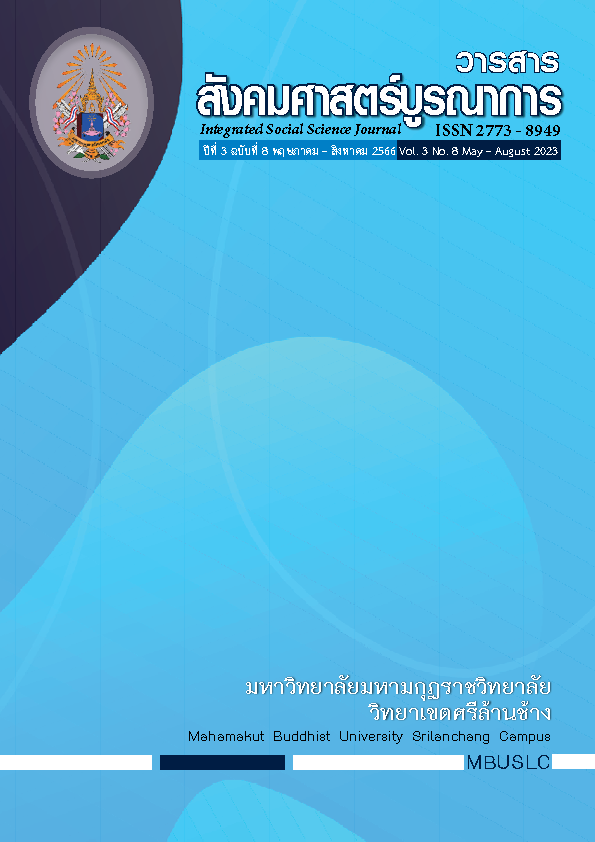SCHOOL ADMINISTRATION IN THE DIGITAL AGE TO PALA 4 OF SCHOOL ADMINISTRATORS IN CHIANG KHAN GROUP UNDER THE LOEI PRIMARY EDUCATION SERVICE AREA OFFICE 1
Main Article Content
Abstract
The objectives of this research were: 1) to study the condition of educational institution administration in the digital era of educational institution administrators; 2) to study the educational institution administration in the digital era according to the Four Bala principles of educational institution administrators; 3) to study the guideline of the educational institution administration in the digital era according to the Four Bala principles of educational institution administrators in the Chiang Khan Educational Quality Group under the Office of Loei Primary Educational Service Area 1. The sample used in the research included 108 participants. The statistics used to analyze the data were: frequency, percentage, mean and standard deviation.
The research results were as follows:
1) The administrators and teachers had their overall opinion on the educational institution administration in the digital era of educational institution administrators in the Chiang Khan Educational Quality Group under the Office of Loei Primary Educational Service Area 1 at the highest level. The highest mean value was seen in the aspect of citizenship in the digital age and the aspect with the lowest mean value was systematic improvement.
2) The administrators and teachers had their overall opinion on the educational institution administration in the digital era according to the Four Bala principles of educational institution administrators in the Chiang Khan Educational Quality Group under the Office of Loei Primary Educational Service Area 1 at the highest level. The highest mean value was seen in the aspect of Saṅgaha-bala (power of sympathy) and the aspect with the lowest mean value was Paññā-bala (power of wisdom).
3) The guideline of the educational institution administration in the digital era according to the Four Bala principles of educational institution administrators in the Chiang Khan Educational Quality Group under the Office of Loei Primary Educational Service Area 1 was that administrators should be visionary and farsighted in creating educational institutes and local curriculums. They should determine to work diligently and concentratedly, have a strong mind, be responsible, and knowledgeable, and manage work systematically and accurately. They should be a good role model in honesty by using the Five Sīla (five precepts) as a guideline for work and should use polite speech in inspiring personnel to work and respect all personnel equally.
Article Details

This work is licensed under a Creative Commons Attribution-NonCommercial-NoDerivatives 4.0 International License.
บทความที่ได้รับการพิจารณาจากคณะกรรมการผู้ทรงคุณวุฒิและเผยแผ่ในวารสารฉบับนี้ เป็นทัศนคติและข้อคิดเห็นส่วนบุคคลของผู้เขียนแต่ละท่าน ไม่ถือว่าเป็นทัศนะคติและความรับผิดชอบ
ของบรรณาธิการ
บทความ ข้อมูล เนื้อหา รูปภาพ ฯลฯ ที่ได้รับการตีพิมพ์ในวารสารสังคมศาสตร์บูรณาการ ถือเป็นลิขสิทธิ์ของวารสารสังคมศาสตร์บูรณาการ หากบุคคลหรือหน่วยงานใดต้องการนำทั้งหมดหรือส่วนหนึ่งส่วนใดไปเผยแพร่ต่อหรือเพื่อกระทำการใด ๆ จะต้องได้รับอนุญาตเป็นลายลักอักษรจากวารสารสังคมศาสตร์บูรณาการ ก่อนเท่านั้น
References
กระทรวงศึกษาธิการ. (2553). พระราชบัญญัติการศึกษาแห่งชาติ พ.ศ. 2542 และแก้ไขเพิ่มเติม (ฉบับที่ 3) พ.ศ. 2553. ราชกิจจานุเบกษา 116 (สิงหาคม 2542).
ณัฐกฤตา กันทาใจ. (2565). การบริหารสถานศึกษาในยุคดิจิทัลของผู้บริหารสถานศึกษาโรงเรียนขยายโอกาสทางการศึกษา อำเภอพาน จังหวัดเชียงราย สังกัดสำนักงานเขตพื้นที่การศึกษาประถมศึกษาเชียงราย เขต 2. การศึกษาค้นคว้าอิสระ กศ.ม. (การบริหารการศึกษา). พะเยา: บัณฑิตวิทยาลัย มหาวิทยาลัยพะเยา.
บุญชม ศรีสะอาด. (2554). การวิจัยเบื้องต้น พิมพ์ครั้งที่ 9. กรุงเทพมหานคร: สุวีริยาสาส์น.
พระมหาศรัณญู อุทยวโร (ปิ่นอำคา). (2560). ภาวะผู้นำตามหลักพละ 4 ของผู้บริหารสถานศึกษาขั้นพื้นฐาน สังกัดสำนักงานเขตพื้นที่การศึกษาประถมศึกษาขอนแก่น เขต 5. วิทยานิพนธ์ พธ.ม. (การบริหารการศึกษา). พระนครศรีอยุธยา: บัณฑิตวิทยาลัย มหาวิทยาลัยมหาจุฬาลงกรณราชวิทยาลัย.
ภวัต นิตย์โชติ. (2560). การพัฒนาสมรรถนะตามหลักพละ 4 ของบุคลากรปกครองส่วนท้องถิ่นในจังหวัดสงขลา. ดุษฎีนิพนธ์ พธ.ด. (รัฐประศาสนศาสตร์). พระนครศรีอยุธยา: บัณฑิตวิทยาลัย มหาวิทยาลัยมหาจุฬาลงกรณราชวิทยาลัย
เศรษฐพงค์ มะลิสุวรรณ. (2564). DIGITAL TRANSFORMATION. ออนไลน์. สืบค้นเมื่อ วันที่ 20 กรกฎาคม 2564 แหล่งสืบค้น https://www.nbtc.go.th/getattachment/News/Information/28909/Di gitalTransformation.pdf.aspx
อัจฉรา จุ้ยเจริญ. (2558). คู่มือการโค้ช เพื่อผู้นำยุคใหม่. กรุงเทพฯ: แอคคอมแอนด์อิมเมจ.
Krejcie, R. V. & Morgan, D. W. (1970). Determining Sample Size for Research Activities. Educational and Psychological Measurement, 30(3), pp. 607-610

